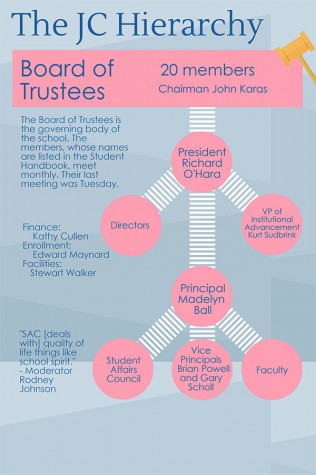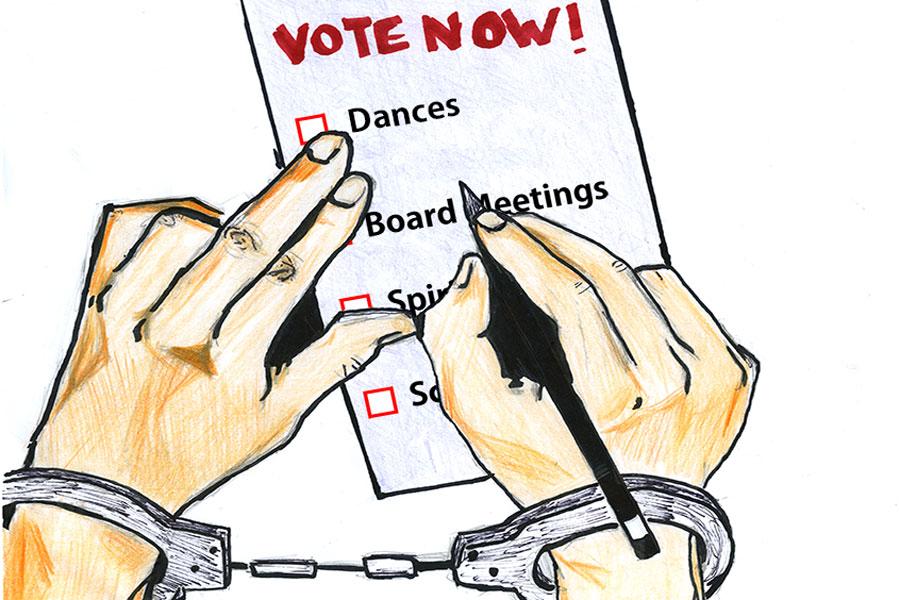Level of student power conveys lack of input
Ideas drive change and as young, creative adults, JC students stand at the forefront of the fight to inspire that change. But where can students take their ideas? Teachers? The Student Affairs Council? The administration?
There are forms of representation that are more effective than others. Is our current system effective?
SAC relies on student initiative to be productive
In a student body of 670 students, the most prominent current form of student representation is the SAC. The officer portion of the Council consists of a president, vice president, and secretary-treasurer as well as three senior class officers and two class officers for the freshman, sophomore, and junior classes.
In addition to these three officers, two representatives from each advisory make up the General Assembly of the Council. The Council meets, on average, twice a month depending on the season.
The purpose of the SAC is to be a service organization, according to the Council’s Constitution. Additionally, the SAC “will support and organize student activities, will provide a means of leadership to students, and represent student concerns to the faculty and administration.”
“SAC [deals with] quality of life things like school spirit,” SAC Moderator Rodney Johnson said.
According to SAC President Rawlison Zhang, “we relay [whatever the students tell us] to the administration and see where we can take it from there. It goes from students, to us, to administration, technically to [Principal Madelyn] Ball.”
“As long as the request is reasonable, the administration is very receptive,” Johnson said.
According to Johnson, the majority of these requests are related to spreading awareness of different causes, such as benefit concerts and coffee houses. Rarely have students come to him as a means to facilitate change. And when they do, it pertains to things out of his control.
“The only thing [I’ve heard of] is the prices of food in the cafeteria, but that’s completely not in our wheelhouse. I [do] point them in the right direction,” Johnson said.
With this lack of student participation, SAC’s responsibility falters.
“Dances are the main thing we are in charge of, but we’re supposed to be role models for student body and follow all the rules,” junior Vice President Parker Day said.
According to Johnson, the SAC can only be as active as the students want it to be. In years past, there have been groups of students who were dedicated to using the SAC to promote change. However, these students have graduated and there haven’t been students to replace them.
“[I think it’s because of students’] apathy,” Johnson said. “[There’s] so much social media and all these different things people have that detract from the real world.”
In the past, there was a Student-Faculty Administration (SFA) that met once a semester. According to Vice Principal for Academics Gary Scholl, “It was a time for student leaders [who were] usually SAC representatives, teachers, and the administration to talk and discuss how things were going and bring up any concerns in general.”
However, according to Johnson, the SFA hasn’t met in seven years.
“Students are so busy now after school, with sports and activities,” Scholl said. But according to Scholl, the council was “effective,” and a “good opportunity for students.”
Without the SFA and students’ lack of initiative with the SAC, the students’ opinions on school-wide issues go unheard.
“Kids are passionate about certain things, but as far as taking it to the school-wide level, not so much,” Johnson said.
“I really think it’s an important part of being in high school, and a high school student, for students to have more ownership for the kind of school we are and the kind of school we can become,” President Richard O’Hara said.
But there is still opportunity for change. “I would like to see the SAC become a more active vehicle in matters that directly affect the students,” Scholl said.
Student representation on the Board of Trustees is nonexistent
In addition to this lack of communication between the students and the administration, there is a lack of communication between the students and the Board of Trustees.
According to Scholl, the Board of Trustees is the governing body of the school due to the fact that JC is a legal corporation. The 20 members, whose names are listed in the Student Handbook, meet monthly. However, there is no student representation on this Board.
“[Having a student representative has been] talked about, but there never was a policy put in place to allow student representation on the Board,” Scholl said.
According to Scholl, the content of the Board meetings “would not be appropriate to have students be a part of the discussion.” Even if there were student representation on the Board, it would still be likely that the Board would go into executive sessions for particularly sensitive issues.
“I don’t know what value there might be [to have a student representative on the Board]. The Board deals with larger issues and concepts dealing with policy,” Scholl said. “There’s also a lot of financial responsibilities. The concerns of the students and concerns of the Trustees aren’t the same.”
According to Johnson, there should be some boundaries in regards to the amount of power the students have.
“It’s not always going to be a democracy,” Johnson said. “Sometimes grown-ups [have to be] in charge to make decisions.”
However, these restrictions do not exist at some of the other schools in the area.
According to Bel Air High School Principal Gregory Komondor, the student government system at Bel Air is set up similarly, with four elected officers representing each grade level. Their government system is responsible for dances, school fundraising, and charity events.
However, Bel Air is able to send a student representative to the Harford County Board of Education and another to the Superintendent’s Advisory Committee.
Komondor said that Bel Air was lucky to be allowed to have these student representatives because they were able to be more influential as a voice for the students.
At the Friends School of Baltimore, four of the Board of Trustee members come from “specific constituencies,” according to their website. These four members are representatives from the student body, the faculty, Parents Association, and the Alumni Board.
According to O’Hara, there are opportunities for parent and faculty representatives to speak to the Board about certain issues. However, once these representatives complete their presentations, they leave the meeting.
While O’Hara doesn’t see a need for student representation on the board, he does think that student power needs to be increased.
“I think there’s always a tendency in schools for the old folks to have more control because there’s a feeling of assurance that it’ll all go better,” O’Hara said. “Educationally for high school students, that’s not the best way to allow you guys to grow.”
Honor Council offers small opportunity for student leadership
Another aspect of student power is the Honor Council, which is co-moderated by Director of Guidance Larry Hensley and religion teacher Thomas Vierheller.
According to Vierheller, the Honor Council is a group of hand-selected students that hears disciplinary cases involving violations of the Honor Code found in the Student Handbook, such as lying, cheating, and theft.
The Deans investigate the situation and present their findings to the Honor Council. The student in question sits in front of his or her peers on the Honor Council while the case is presented and deliberated.
“[The Honor Council members] determine the punishment. By then, guilt is already established,” Vierheller said.
Officially Principal Madelyn Ball and the Deans have the ability to veto the Honor Council’s ruling. But according to Vierheller, in the eight cases heard by the Honor Council in the 2013-2014 school year, none of the rulings were vetoed.
Although the implementation of the Honor Council has been one of several changes in the JC community that have increased student involvement, such as students’ leading the prayer and pledge every morning, Vierheller still feels that students should be given more power in their community.
“Students do more than we give them credit for,” Vierheller said. “I think we should depend on seniors for a lot more.”
Schedule change committee requests students’ input
On Nov. 17, the SAC and National Honor Society met with the administration to discuss the schedule changes that will be implemented in the following year.
The students were presented with one potential schedule and the advantages of that schedule. The administration will then answer any questions the SAC and NHS representatives have and listen to their input.
For The Patriot’s view on student power, check out “Students deserve a greater voice in their community.”
Angela DeCarlo is the Stories Chief and Claire Grunewald is a Lifestyles Editor for The Patriot and jcpatriot.com.



